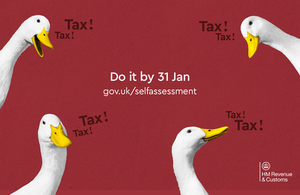Do your tax return before it drives you quackers, you’ve got one week to go!
HMRC is urging more than 3 million customers who have not yet submitted their 2018 to 2019 Self Assessment tax return to do so before the 31 January deadline.

More than 3 million customers are yet to send in their 2018 to 2019 tax returns and have just one week left to the deadline, HM Revenue and Customs (HMRC) warns today (24 January 2020).
The deadline for completing tax returns online is 11.59pm on Friday 31 January. 8.5 million customers have avoided the niggle and already filed their Self Assessment, and HMRC is urging those who haven’t to do so as soon as possible to avoid any last minute problems.
Anyone worried that they will not be able to complete their tax return by the deadline should contact HMRC as soon as possible.
Lots of help is available on GOV.UK, from the Self Assessment helpline on 0300 200 3310 and on social media.
This week, the Financial Secretary to the Treasury visited HMRC’s Cardiff office to see the Self Assessment operation in action. During the trip, he also met with apprentices and other colleagues working in customer services.
Jesse Norman, Financial Secretary to the Treasury, said:
The deadline is fast approaching for more than three million taxpayers who have not yet managed to file their tax returns. With only one week until 31 January, HMRC strongly encourages people to file their Self Assessment.
Anyone who believes they might not be able to file on time should make sure to call or email HMRC.
Angela MacDonald, HMRC Director General of Customer Services, said:
We’re here to help customers get their tax right, and have put in place a range of help from online services, webinars and videos, to customer service helplines, webchats and social media channels.
We know completing a tax return can be confusing at times, so please do get in touch if you’re still concerned about how to file, or about paying what you owe. HMRC colleagues are standing by to provide support and advice ahead of the deadline.
Lots of help is available on GOV.UK, from the Self Assessment helpline on 0300 200 3310 and on social media.
Further information
11.7 million Self Assessment returns are due. Returns received includes unsolicited returns and returns not due until after 31 January.
The penalties for late tax returns are:
- an initial £100 fixed penalty, which applies even if there is no tax to pay, or if the tax due is paid on time
- after 3 months, additional daily penalties of £10 per day may be charged, up to a maximum of £900
- after 6 months, a further penalty of 5% of the tax due or £300, whichever is greater
- after 12 months, another 5% or £300 charge, whichever is greater
There are also additional penalties for paying late of 5% of the tax unpaid at 30 days, 6 months and 12 months.
Self Assessment guidance is available online.
Between 30 January, and 31 January, our phone helplines shut at 8pm. Customers can contact us via Webchat until midnight both days.
Tax is automatically deducted from the majority of UK taxpayers’ wages, pensions or savings. For people or businesses where tax is not automatically deducted, or when they may have earned additional untaxed income, they are required to complete a Self Assessment tax return each year.
Be aware of copycat websites and phishing scams – always type in the full online address http://www.gov.uk/hmrc to obtain the correct link to file your Self Assessment return online securely and free of charge.
HMRC uses your home address to determine whether you should be paying UK or Welsh/Scottish Rate of Income Tax, make sure yours is up to date by accessing your Personal Tax Account or https://www.gov.uk/tell-hmrc-change-of-details.
Customers can also register for HMRC’s help and support email service at https://www.gov.uk/government/collections/hmrc-webinars-email-alerts-and-videos or by going to GOV.UK and searching ‘HMRC videos, webinars and email alerts’.